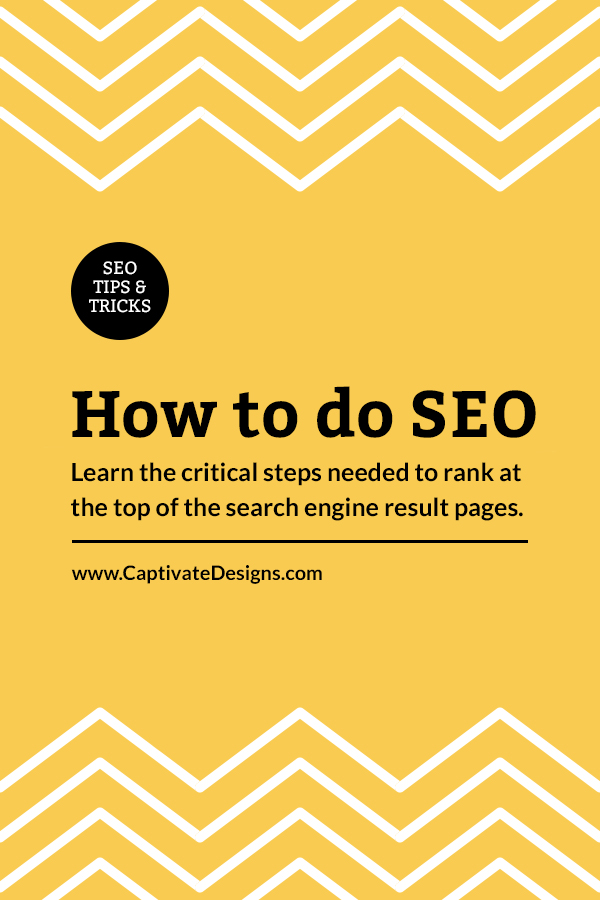

Learning how to do SEO (Search Engine Optimization) can be overwhelming. Backlinks, Keywords, On-page, Off-page, what does it all mean? This article is designed to answer these questions and simplify how to do SEO.
To excel at SEO, it is important to understand that search engines rank your website based on two over-arching pillars:
Relevance
How relevant are your web pages to the specific search queries that your target audience or ideal clients enter the search engines? This is the first question search engines ask before they determine if you should “show up” in the search results when a query or search is made. This is one reason the words you use on your page to describe your products and/or services are essential to your SEO success.
Authority
Is your website authoritative? Do other people reference or site your website? Do they vote for you in the form of backlinks? Links from their site to yours. The more people that link to you, the more authority your website has. Think about it: if a website has a lot of links from other reputable sites, then it is an endorsement that your website is also reputable.
Making your website relevant to search queries
For your website to pass the relevancy test, you need to create content that is relevant to the queries that your target audience is entering into search engines to locate businesses like yours. So, how do you achieve this?
It starts with getting a clear understanding of:
- Who your target audience is?
- What are their needs and challenges?
- What solutions are they searching for?
- What questions do they have?
- What words or phrases are they searching for?
The power of keyword research
So, what is a keyword? A keyword is a word, phrase, or string of words that a user enters as a search engine query.
Keyword research is the process of uncovering precisely what your target audience is searching for. Keyword research helps you to discover:
- exactly what terms your target audience is using to search online for your products and services
- how many searches there are for each term, and
- how competitive it would be for you to rank for those keywords
How to do keyword research?
To do keyword research, start by compiling a list of all the possible keywords that you think your ideal clients will enter as a search engine query.
Next, discover and add keywords your competitors are ranking for to your list. Note that your online competitors are very different from your offline competitors.
Now that you have compiled a list enter the list into the Google Keyword Planner Tool to get additional ideas and to determine, on average, how many searches per month each keyword receives.
It is very important to verify that these keywords are getting some searches, because the last thing you want to do is to spend time optimizing for keywords that are not getting any searches.
Evaluating the competitiveness of a keyword
After you have verified that the keywords you would like to target are getting searches, the next step is to check the keywords to evaluate how difficult it would be for you to rank for those keywords. To do so, you can use a keyword difficulty tool such as Keyword Explorer by Moz.
Eliminate those keywords that are deemed too difficult to rank for based on the scores from the keyword difficulty tool. This will help you narrow your list of keywords, and now you’re ready to optimize your website.
Optimizing your website
Now that you know what keywords your target audience is searching for, you’re ready to optimize your website.
To optimize your website, you need to focus on choosing one keyword and creating content that is relevant and specific to that keyword.
You will also need to place your focus keyword in key areas on your website.
This includes adding your keyword to your:
Page Title
When you conduct a search the list of results comes up. The page title or title tag is the first line of text in blue that’s hyperlinked to your web page. Title tags tell search engines and users what the page is about and are also one of the most important on-page elements for SEO. The title tags are also visible in your web browsers.
Page URL
With the exception of your homepage, you should include the keyword in your URL, for e.g., take your services page. Typically, your URL for your services page may be www.yourwebsiteaddress.com/services. Services are very generic and don’t really give the search engines an idea of what type of service you provide. To make your page relevant, it would be best to put your keyword in the URL. For e.g., since I offer SEO services, the URL would be https://captivatedesigns.com/small-business-seo-service/. Now, the link accurately describes what you do.
Header Tags
Heading tags, also known as H Tags, are important to your website’s content for two reasons. They help make your web page content easier to read through the use of subheaders by making it easy for readers to scan and get an idea of what your content is about. H Tags also help your SEO because they send signals to search engines that the text within the Header tags is important. Hence, your heading tags are a great place to include your keywords.
Your Page Content
Your keywords should naturally be written into your page content. A rule of thumb is to write for users and not for the sole purpose of search engines. You also want to include synonyms and clarifying words. Adding synonyms will help you rank for more keywords, clarifying words help to further demonstrate what the page content is about. For e.g., if you are optimizing for the keyword “Granny Apples,” using words such as healthy choice and fruits will let the search engines know that you are relevant to Apple the fruit and not Apple computer.
Optimize Your Images
By optimizing your images, you have a better chance of showing up in search engines image search. “According to a study by Hoosh Technology a world-renowned research institute for Artificial Intelligence, 63 percent of users who conduct Google image searches and click on pictures ultimately visit the website where the picture originated. “This is a huge opportunity for creative businesses that are image driven such as interior decorators, photographers, boutiques, the list goes on. Image optimization can take two forms. Optimizing for relevance by using the keyword as the image file name and optimizing the image to the actual size that’s needed to help improve your website page speed.
Congrats you have now taken the steps to make your website relevant to your target audience searches by performing key on-page optimization. The next step is getting found and getting to the top of the search engine results pages, the highly coveted first page.
Off-Page Optimization
Often referred to as backlinks, off page optimization is all the steps that you take off your website to get your site to rank at the top of the search engine results page.
Backlinks are links from other websites to your website. Search engines view backlinks as citations, and the more citations your website has, the more credible and trustworthy your website appears in the eyes of search engines.
So, yes, it’s essentially a popularity contest, the more backlinks you have the greater your chances of outranking your competition.
How to build backlinks?
Create content that people would want to link to and share with others. Great content is natural magnets for others to link to. Content takes many forms.
- Blog Post
- Surveys Results
- Infographics
- Videos
- Guides
What to do after you have created your content?
To see the results and acquire backlinks, you need to take steps to promote your content after you have created it.
A good place to start is sharing the content on your various social media platforms.
But don’t stop there
Use link roundups to get backlinks
Reach out to popular blogs and influencers in your industry that do link roundups. Link roundups are simply a daily or weekly list of all the best pieces of content. Find the influencers that do roundups for your industry and ask them to consider your content for their roundup.
How to find roundups?
Simply, go to Google, search for your industry keyword + link roundups. For e.g. If you’re a wedding planner you will type wedding planners + weekly link roundup into Google.
Now that you know the steps on how to do SEO. Here are your action items.
- Conduct keyword research to find what keywords your target audience is searching for using the Google Keyword Planner.
- Check the keyword difficulty score using a tool such as MOZ
- Eliminate keywords that have a high difficulty score
- Focus on optimizing one keyword per page
- Create content that includes the keyword you want to show up for
- Optimize the content by placing the keyword in the page title, page URL, page meta description, header tags, and images
- Get backlinks to your website by creating and promoting your content
Have Questions? Ask us in the comment below.